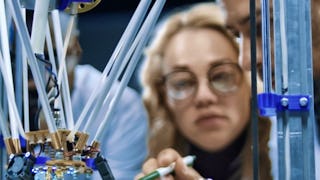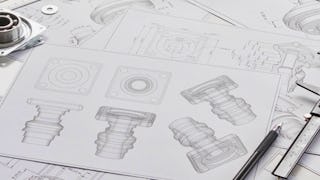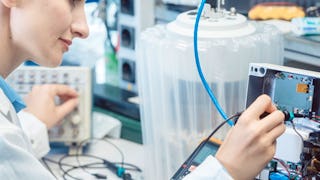Hello, everyone! Welcome to this course on Rapid Prototyping Materials and Tooling. This is part of the Rapid Prototyping and Tooling specialization. In this course, I’ll cover the characteristics and appropriate uses of a variety of prototyping materials, including cardboard, plastic, wood, and aluminum. I’ll also cover some of the common forms of traditional machining used in making prototypes, as well as more advanced manufacturing tools such as 3D printers, laser cutters, and more!

Genießen Sie unbegrenztes Wachstum mit einem Jahr Coursera Plus für 199 $ (regulär 399 $). Jetzt sparen.

Rapid Prototyping Materials and Tooling
Dieser Kurs ist Teil von Spezialisierung für Rapid Prototyping and Tooling

Dozent: Daniel Frank
Bei enthalten
(22 Bewertungen)
Empfohlene Erfahrung
Was Sie lernen werden
You will understand the strengths and weaknesses of common materials and tooling used for rapid prototyping and situations for when to use each one.
Kompetenzen, die Sie erwerben
- Kategorie: Safety Training
- Kategorie: Prototyping
- Kategorie: Manufacturing Processes
- Kategorie: 3D Modeling
- Kategorie: Mechanical Engineering
- Kategorie: Materials science
- Kategorie: Manufacturing and Production
- Kategorie: Personal protective equipment
Wichtige Details

Zu Ihrem LinkedIn-Profil hinzufügen
Erfahren Sie, wie Mitarbeiter führender Unternehmen gefragte Kompetenzen erwerben.

Erweitern Sie Ihre Fachkenntnisse
- Lernen Sie neue Konzepte von Branchenexperten
- Gewinnen Sie ein Grundverständnis bestimmter Themen oder Tools
- Erwerben Sie berufsrelevante Kompetenzen durch praktische Projekte
- Erwerben Sie ein Berufszertifikat zur Vorlage

In diesem Kurs gibt es 4 Module
Hello, everyone! Welcome to this course on Rapid Prototyping Materials and Tooling. This is part of the Rapid Prototyping and Tooling specialization. In this course, I’ll cover the characteristics and appropriate uses of a variety of prototyping materials, including cardboard, plastic, wood, and aluminum. I’ll also cover some of the common forms of traditional machining used in making prototypes, as well as more advanced manufacturing tools such as 3D printers, laser cutters, and more! By the end of this course, you should have a better understanding of the strengths and weaknesses of common prototyping materials and manufacturing processes, as well as the situations in which their use is most appropriate. The hope is that by having a better understanding of these materials and machines, you will be able to better develop high-quality prototypes. There's a lot of really exciting content to cover in this course, so without further ado, let’s dive into the world of rapid prototyping!
Das ist alles enthalten
3 Videos2 Lektüren
In this module, you will learn about basic material properties such as density, toughness, and strength. You will also learn about the different characteristics of common prototyping materials like cardboard, plastics, wood, and aluminum.
Das ist alles enthalten
5 Videos2 Aufgaben
In this module, you will learn about the different types of traditional machining tools that are useful for making prototypes, such as the hack saw, bandsaw, chop saw, hack saw, drill press, lathe, and mill.
Das ist alles enthalten
1 Video2 Aufgaben
In this module, you will learn about many different CNC machines that can be used to fabricate prototypes. In particular, this module will go into detail about the considerations and choices an engineer needs to make when making a part with a 3D printer or a laser cutter.
Das ist alles enthalten
3 Videos10 Lektüren3 Aufgaben1 peer review
Erwerben Sie ein Karrierezertifikat.
Fügen Sie dieses Zeugnis Ihrem LinkedIn-Profil, Lebenslauf oder CV hinzu. Teilen Sie sie in Social Media und in Ihrer Leistungsbeurteilung.
Dozent

Mehr von Mechanical Engineering entdecken
 Status: Kostenloser Testzeitraum
Status: Kostenloser TestzeitraumArizona State University
 Status: Kostenloser Testzeitraum
Status: Kostenloser TestzeitraumArizona State University
 Status: Kostenloser Testzeitraum
Status: Kostenloser TestzeitraumArizona State University
 Status: Kostenloser Testzeitraum
Status: Kostenloser TestzeitraumArizona State University
Warum entscheiden sich Menschen für Coursera für ihre Karriere?





Neue Karrieremöglichkeiten mit Coursera Plus
Unbegrenzter Zugang zu 10,000+ Weltklasse-Kursen, praktischen Projekten und berufsqualifizierenden Zertifikatsprogrammen - alles in Ihrem Abonnement enthalten
Bringen Sie Ihre Karriere mit einem Online-Abschluss voran.
Erwerben Sie einen Abschluss von erstklassigen Universitäten – 100 % online
Schließen Sie sich mehr als 3.400 Unternehmen in aller Welt an, die sich für Coursera for Business entschieden haben.
Schulen Sie Ihre Mitarbeiter*innen, um sich in der digitalen Wirtschaft zu behaupten.
Häufig gestellte Fragen
To access the course materials, assignments and to earn a Certificate, you will need to purchase the Certificate experience when you enroll in a course. You can try a Free Trial instead, or apply for Financial Aid. The course may offer 'Full Course, No Certificate' instead. This option lets you see all course materials, submit required assessments, and get a final grade. This also means that you will not be able to purchase a Certificate experience.
When you enroll in the course, you get access to all of the courses in the Specialization, and you earn a certificate when you complete the work. Your electronic Certificate will be added to your Accomplishments page - from there, you can print your Certificate or add it to your LinkedIn profile.
Yes. In select learning programs, you can apply for financial aid or a scholarship if you can’t afford the enrollment fee. If fin aid or scholarship is available for your learning program selection, you’ll find a link to apply on the description page.
Weitere Fragen
Finanzielle Unterstützung verfügbar,
¹ Einige Aufgaben in diesem Kurs werden mit AI bewertet. Für diese Aufgaben werden Ihre Daten in Übereinstimmung mit Datenschutzhinweis von Courseraverwendet.

